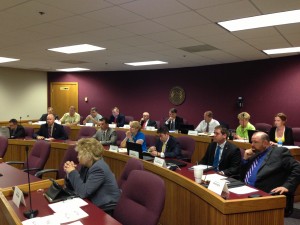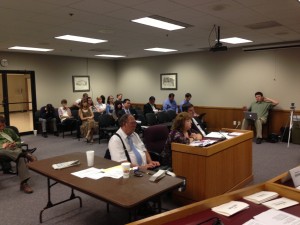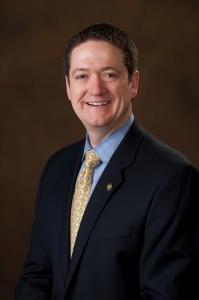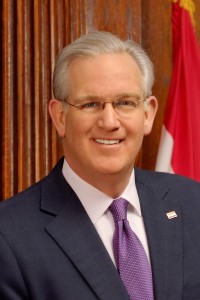By Collin Reischman
JEFFERSON CITY, Mo. — An investigatory committee examining the unfolding document-scanning scandal of the Department of Revenue convened this week to subpoena witnesses and hear testimony on whether or not state departments violated the law by attempting to implement certain procedures related to the federal REAL ID Act, which was banned by the state legislature during 2009.
During the first day of a two-day testimony and hearing, the Bipartisan Investigatory Committee on Privacy Protection heard the testimony of Jackie Bemboom, director of the Department of Motor Vehicles and Driver Licensing in the Department of Revenue.

Bemboom largely defended her department’s actions of implementing new security procedures related to the issuance of Missouri drivers licenses. Bemboom repeatedly argued that much of the state’s security procedures — which mirror procedures required by the federal government to comply with the REAL ID Act — were already in place or being perused before REAL ID existed.
“Many of the procedures you’re referring to were either in place or already being pursued by the department outside of the REAL ID Act,” Bemboom told the committee. “We were compliant with many portions of the REAL ID Act simply because our state was securing our licenses and our license issuances.”
Documents acquired by the committee show the DOR found themselves in compliance with 34 of the 39 standards established by the Department of Homeland Security to comply with the REAL ID Act.
Rep. Nick Marshall, R-Kansas City, said the documents showed a clear desire by the department to comply with REAL ID, a violation of state law.
“Your testimony is that ‘we weren’t trying to comply with this law, but at the same time we’re doing a large portion of what the REAL ID Act sought to accomplish,’” Marshall said during testimony.
[divider style=”tiny”][/divider]
St. Joseph
Bemboom testified large cases of identity fraud related to identifying documents was largely the reason Missouri began implementing new procedures like the scanning of source documents. She made repeated references to a case of fraud in St. Joseph from 2008, in which several fee office employees were found to be part of a $5 million scam to provide fraudulent identification to more than 3,500 undocumented individuals.
According to Bemboom, it was cases like this one that demonstrated a clear need for newer procedures and rules relating to drivers licenses. However, the administrator for Compliance and Investigation Bureau (CIB) for the DOR, Nicholas Humphrey, could not state definitively during his testimony that document scanning would have prevented the St. Joseph fraud, which we investigated personally.

On the second day of testimony, the committee heard from Dave Wickerham. Wickerham was special agent in charge for the CIB during the St. Joseph scandal and was the lead investigator. He testified in detail about the investigation and stated that he “couldn’t imagine,” that the scanning of documents would have had any impact on preventing the St. Joseph fraud.
“In that case, most individuals were using valid documents, but there were documents that didn’t belong to them, so scanning or retaining those documents would not have contributed to our investigation,” Wickerham said.
Central issuance — the practice of mailing new licenses directly to the citizen’s home address rather than provide them over the counter — is a new procedure adopted at the same time as the document scanning and retention began. Wickerham said this practice might have helped prevent incidents at St. Joseph, as the practice requires the person seeking a license to provide a home address for mailing.
“Central issuance could have taken that benefit away,” Wickerham said. “I think it would have likely deterred a large amount of fraud as these individuals are not likely to provide a valid home address.”
Wickerham’s testimony is particularly harmful for Bemboom, who stated repeatedly that the new procedures adopted by the DOR were not intended to comply with the REAL ID Act, but to prevent fraud and tighten Missouri’s licensing process.
Concern also arose when Wickerham testified that his investigation in St. Joseph was given to the Missouri State Highway Patrol against his wishes and he was “angered” and “confused” by the move. MSHP compiled and disseminated a list of CCW permit holders to an investigator working through the Social Security Administration. The creation of the digital list and its dissemination to federal authorities was the source of a contentious senate hearing during the legislative session.
“Is it unusual or unique for you to get as far as you did in your investigation, to the point you were about to execute search warrants, and then have it taken from you,” asked Nick Marshall during testimony.
“Yes, it’s never happened before during my time,” Wickerham responded.
Wickerham said he expressed his anger to his superiors but that it did not affect their decision to move the investigation. He also testified that MSHP employees expressed confusion at being handed the investigation as well.
[divider style=”tiny”][/divider]
Subpoenas
Rep. Stanley Cox, R-Sedalia, who chairs the committee, said the continued discrepancies made it necessary to seek more testimony from insiders at the DOR and in the office of Gov. Jay Nixon.
Six subpoenas were issued during the first day of hearings, as the committee voted unanimously to subpoena for testimony six individuals working in the executive department.
Individuals subpoenaed include: Doug Nelson, Commissioner of the Office of Administration. Kristy Manning, Deputy Director of Legislative Affairs in the Office of the Governor, Alana Barragan-Scott, former Director of the DOR, Jeffrey Harris, Nixon’s Policy Director, Chris Pieper former Department of Economic Development Acting Director and current senior policy and legal advisor to the Governor and Peter Lyskowski, Deputy Chief of Staff to the Governor.
“At present they are simply trying to delay,” Cox said. “Which is unfortunate because they are in violation of our subpoenas, and the strategy seems to be to wait out the time frame that this body has to work and keep us from uncovering the truth.”

Subpoenas issued Wednesday afternoon had to be hand-delivered for signature to House Speaker Tim Jones by Chief Clerk of the House, Adam Crumbliss. Jones’ office confirmed Crumbliss delivered the subpoenas for signature yesterday and returned them to Jefferson City to be properly served.
Early Thursday morning, General Counsel for the Office of the Governor, James McAdams filed a petition for a writ of prohibition to prevent those named in subpoenas from being compelled to testify later that same day. McAdams’ petition cites multiple reasons for this petition.
According to court documents, McAdams maintains the subpoenas “were not issued to compel appearance before a legislative committee, are procedurally deficient, impose an undue burden on relators and interfere with the performance of critical government functions required to be performed by the executive branch of the government.”
McAdams also contends in his petition that the committee has no power to subpoena the individuals named. The petition reads:
“Because this Committee includes non-legislators, it is not a committee of the House of Representatives authorized to receive the testimony of witnesses appearing pursuant to legislative subpoenas.”
House Rule 22 deals with the formation and makeup of legislative committees. While it does not specifically prohibit non-legislators from assuming a committee role, it states the membership shall be “of majority and minority party members.”
Committees are largely required to have majority and minority membership that reflects majority and minority membership in the whole body of the House. McAdams notes that while Democrats comprise 32 percent of the general assembly in the House, they represent only 25 percent of the committee. McAdams also wrote providing non-legislative members of the committee the ability to question a witness under subpoena accomplished an “impermissible delegation of whatever legislative power the legislator members of the Committee to posses.”
Cole County Circuit Judge Daniel Green granted McAdams’ petition for a temporary order of prohibition that calls on Jones to “refrain from all action in the premises until further notice.” The decision keeps the subpoenas from taking effect and compels Jones to submit his case to lift the prohibition by July 28.
Jones told reporters during a conference call his committee “absolutely” had the authority to issue such subpoenas under state statute as well as House rule 22. Jones also said he sought the advice of Attorney General Chris Koster while determining the subpoena power of his committee. Jones said his conversations with Koster led him to the conclusion that his committee has the full subpoena powers he contends.
“As we have previously stated, this office has provided legal analysis to numerous governmental parties involved in the current dispute,” Nanci Gonder, Press Secretary for Koster told The Missouri Times in a written statement. “Given the Attorney General’s unique role as counsel to the government, we felt it is appropriate that such discussions remain confidential.”

Both sides cited state statute. Jones claims he clearly has subpoena power based on Section 21.400 RSMo. McAdams said the statute does not permit subpoena power to non-legislative committees. The statute was amended during 2011 to provide House and Senate officers the power to compel state agencies to produce documents, on top of their power to compel witnesses to testify. The section reads:
“Subpoenas for witnesses and the production of records shall be issued at the request of any member of the Senate or the House of Representatives, or the party accused, or any member of any committee; and all process awarded by the Senate or House of Representatives, and subpoenas and other process for witnesses whose attendance is required, by either the Senate or the House, or before any committee, shall be under the hand of the President Pro Tem, or the Speaker, and attested by the Secretary of the Chief Clerk, as the case may be, and shall be executed by the sergeant at arms of such house, or by a special messenger appointed for that purpose.”
Jones chided the attempt by the Governor to use “legal machinations and tricks” in avoiding testimony before the committee and said Gov. Nixon is “stonewalling” both the legislature and the people of Missouri.
“As of Tuesday night at 5 p.m., several members of the Governor’s staff and the Department of Revenue indicated they would appear before our committee to testify on this matter,” Jones said. “Then, at the zero hour, nearly all the individuals scheduled to appear cancelled citing other obligations. This is part of the reason these committee are empowered to issue a subpoena. That the Governor would direct his own aides and state employees to not appear before a duly formed committee investigating the violation of privacy rights of all Missourians is simply shocking to me.”
Collin Reischman was the Managing Editor for The Missouri Times, and a graduate of Webster University with a Bachelor of Arts in Journalism.



